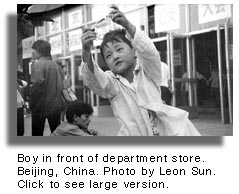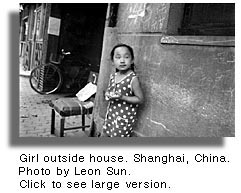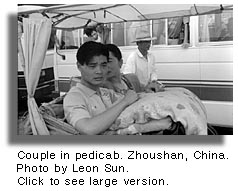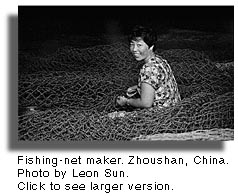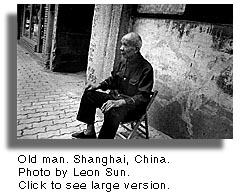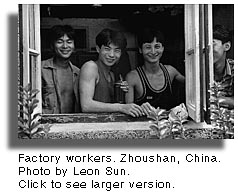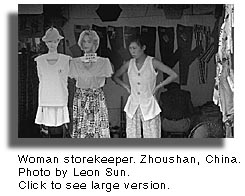| My family left Shanghai for Hong Kong when I was seven. ... Personal Recollections and a Photo Essay by Leon Sun Shanghai, China and San Francisco, U.S.A.
I went to China in August 1994 as a member of the Richmond, California/ Zhoushan Sister City delegation. Zhoushan is a fishing and port city in the Yangtze Delta southeast of Shanghai. On this trip I also visited Beijing and my home city of Shanghai. I had visited China once before, in 1984. This time I went there with mixed feelings. I wasn't sure I would like what I was going to see there. I had heard so much about the corruption and environmental disasters, and that so many of the good revolutionary things were being thrown out with the bad. The reforms and liberalization had allowed the return of gross inequalities between rich and poor, women and men and old vices such as prostitution and drugs. People have become increasingly selfish and materialistic. While the revolution had all but destroyed traditions it had not replaced them with a new, viable and lasting ethic. Only some of the most crude and backward conventions seemed to have endured, and nowhere were these resurgent attitudes more clearly reflected than in the status of women. Thus, unlike 1984, when I went starry-eyed and in partial disbelief that I was actually going to China, I was skeptical and cynical. My family left Shanghai for Hong Kong when I was seven. Back then, at the height of the Cold War, no one in his right mind would have entertained the idea of going back to China in one's lifetime. Besides, who would want to? It wasn't until I came to live in the United States when I developed a longing to go back. China had come to represent my lost childhood. After years of feeling alienated and discriminated against in America I had looked to China as an ideal. I had joined up with Leftist movements here and looked to China not only as the motherland but the socialist motherland. The 1984 trip exceeded all my expectations. I was able to reconnect with a part of my life that had been lost and presumed dead. I felt whole again, and, for the first time, I was able to accept the fact that I had already become American. At that point, I had actually spent more years of my life in America than China and Hong Kong combined. By 1994, just ten years after my last visit, so much had changed - the collapse of the Soviet Union, the coming down of the Berlin Wall, the dissolution of the Left in America, and, of course, the June 4th Massacre. With the latter, in particular, I felt a deep sense of betrayal. It was a wake up call to re-examine everything I had believed in and stood for in my adult life. Meanwhile, I had also reached middle age. As China replaced "Serve the people" with "To get rich is glorious," I replaced "moving mountains" with riding over them - on mountain bikes and road bikes alike. I had always been an avid cyclist. Now I became a fanatic. Staying young is glorious. It soon became obvious, however, that I wasn't going to stay away from Chinese matters for long. Once the sister city project came up with the city of Richmond, my employer, there was nothing I could do to stay away. I was invited to join the delegation. My wife Karen wanted to come too, so she bought her own ticket, and off we went. August 31, 1994I had not forgotten how oppressive the summer Monsoon heat and humidity can be in most of China in August. Sure enough, the minute we stepped off the plane, we were greeted with a rush of hot, damp air. In 1984, my auntie, whom I hadn't seen in twenty-seven years, was there to greet me. This time it was the welcoming committee from Zhoushan who had traveled to Shanghai to meet us. After the photo ritual we stepped out of the airport in our own little groups. I noticed immediately the changed skyline and the first thing I saw against the setting sun was a billboard of the Marlboro Man. I guess it was a testament to my own changes that I wasn't too offended by the sight of this most despicable of Yankee icons. You can't be too Pavlovian about it, I said to myself. It was just a symbol of the inevitable. Besides, this was, after all, Shanghai - a city known for its past as a bustling, cosmopolitan, commercial center. Indeed, Shanghainese have always been an urbane and worldly lot, so sure about themselves that they are considered cocky by their countrymen. They have always placed themselves on par with the rest of the world. Whatever the game, they were ready to play, and before long, they would be defining their own terms. The years of Western dominance never succeeded in giving Shanghainese an inferiority complex. Seeing more of Shanghai in the next few days, it appeared evident that the city was reclaiming its prima donna status in China's dance with the future. As we were driven into Shanghai city proper, I began to see just what was meant by those articles I had read about "the growing Pacific Rim," or "China, the next economic giant." We were humming along in an air-conditioned Japanese built bus on a brand-new, wide and brightly lit highway. It was a far cry from bumping along the dusty country road in one of those old Chinese made Russian cars from our last trip. That car still had lace curtains in the back windows. In the hazy night air, the street lamps cast rose colored halos around themselves, spilling their eerie light onto the pavement and making the road look like a highway to dreamland. Not long after leaving the airport, we were caught in a massive traffic jam. This made it even more surreal, like one of those illogical changes in a dream sequence. There was construction going on everywhere, never mind that it was already well past midnight. Carbon arc lamps cast a bluish tint to the murky, polluted skies, turning night into day. The pounding of pile drivers added yet another layer of noise to the constant rumble of idling engines and cacophony of human voices. Guess Chinese talk loud everywhere. All that construction was, in fact, one of the main causes of our traffic jam. Straining our necks to look past the cars in front of us we could see that we were going under an overpass of yet another highway being built. The sparks from a welder perched precariously above were falling directly onto the traffic below. Yet nobody seemed to be bothered by it. Bicyclists rode right around it and cars just let the sparks fall onto their roofs. Mainly people were just interested in moving on. Traffic jams may slow them down, but it only strengthened their determination to plow on. Nothing was going to slow them down on their way to becoming glorious. We drove for a few more miles through the streets of Shanghai. People were everywhere. As Americans, we were unaccustomed to seeing this much life in the streets at night. We don't see this much life in the streets, period, unless you lived in New York. All the stores were open and brightly lit. And there were more signs of foreign businesses. I saw a Volvo dealership, as well as Peugeot and Volkswagen. Of course, Toyotas and Nissans all over the streets. American cars were noticeably missing. Office towers scraped the skies with neon signs brashly flaunting their European and Japanese corporate names and logos. Sitting on there among a bus load of Americans, I was reminded that, once again, the "barbarians" are in the Middle Kingdom. I thought of my history lessons and the name "Macartney" popped up. (No, not McCartney, as in Paul.) In 1793, exactly two hundred years ago, the Macartney embassy, representing King George III, paid a call to the Qian-long emperor. He came bearing gifts, but it wasn't enough. The emperor regarded him as a tributary, and demanded that Macartney kow tow to him, just like everyone else. But the old dabizi ("big nose") refused, and was henceforth dismissed from the court, with a note to take back to the King of England, saying: " ... our celestial empire possesses all things in prolific abundance." In other words, we've got everything we could possibly want. Don't bother to come back till you have something to show us. So now, two hundred years later, they're back, to a China no one could have imagined in Macartney's day. This was no longer the emaciated, humiliated China of the Opium Wars. The old Celestial Empire, in defeat, had conceded to the Western powers a number of "Treaty Ports," and "Concessions," which included Shanghai, and other little enclaves along the South China coast. In addition, Hong Kong and Macau became outright colonies of the British and the Portuguese. There the "barbarians" were allowed to do business with a reluctant Empire on a limited basis. How ironic that the present Chinese government also chose to establish "Special Economic Zones" in the same Southern coastal cities, like Shenzhen, for example, to do business with the outside world, to experiment with "opening up" on a limited, trial basis. How ironic that the "Celestial Empire" has become the People's Republic, and the foreigner now has practically everything that China needs. Things do have a way of becoming their opposites. But most significant, of course, is the fact that the foreigner now comes to China on Chinese terms. I wondered what was on the minds of the modern day "barbarians" on our bus - the American delegation from Richmond, California, with me among them. As we sat in traffic in awe of all the tremendous energy being expended around us, many of our delegation felt a newfound respect for the Chinese way. As Americans they were naturally impressed by the "just do it" ethic. I detected a bit of nostalgia as they seemed to be reminded of a younger, more brash and "can-do" kind of America. After seeing the shower of welding sparks falling onto the roadway and the obvious lack of safety precautions on the construction sites, I didn't even want to think of the social and environmental impact all this was going to have on not only China but the world. Nothing in China is measured in small numbers. When China moves, the rest of the world shudders. And I was particularly apprehensive as I wondered what was happening to Chinese culture. As we moved closer into the city center the traffic, both human and vehicular, became denser and denser. Looking at, literally, the "masses" of people outside the windows of our air-conditioned bus, it was difficult to imagine the horrors of June 4 just five years ago, or any of the many social-political catastrophes that had plagued the Chinese people almost regularly for the past forty years - the ceaseless political campaigns, the disasters of the Great Leap Forward, and the Cultural Revolution. I thought of the Shanghai of my childhood. My family lived there through most of the fifties, through the first decade after Liberation. Even though my parents were defiantly anti- communist, the majority of people were pretty hopeful and optimistic, particularly those who had been on the bottom of society before. I remember standing by the window of our apartment and watching the many parades that went by on our street. I could still hear in my mind the beating of drums and crashing of cymbals and the many chants of "Long Live Chairman Mao!" or "Long Live the People's Republic of China!" I was so envious of the youth in red scarves - the Young Pioneers. My parents always said that these were merely empty rituals orchestrated by local Communist Party cadres, but I could tell people were genuinely happy. Children could always tell. The Young Pioneers and the soldiers of the People's Liberation Army were my early role models. Where were those people now? Did they survive all the upheavals that my family was fortunate to miss? Could they be in this crowd somewhere? So much has happened since then. How did the Chinese people weather all this? More importantly, how was it that I saw no signs of such a troubled past? Everyone looked happy and driven, busy going about their business. People looked well fed and well dressed - certainly more fashionable than ten years ago. For an outsider, it would have been easy to come away with the impression that things have always been this way. I asked myself whether this congenial scene was a result of general amnesia or effective repression. Was this a sign of the new cynicism that came with political disaffection and the "to get rich is glorious" ethic, or are Chinese an enduring and pragmatic people eager to get on with life? On our first night we stayed at none other than the Shanghai Mansions hotel before heading out to Zhoushan. I say "none other" because this was also a place rooted in history. In the old, pre-Liberation days, it was known as the Broadway Mansions, an exclusive apartment building accessible only to Europeans, mainly British, and a few Chinese. It was in the heart of the so-called International Settlement, which was really just the British concession. Across the street from it was the notorious park which posted signs at its gates saying "Chinese and dogs not allowed." Now Broadway Mansions has been turned into Shanghai Mansions. Karen and I had stayed there in '84 - before it was refurbished into its current incarnation, with contemporary, Hong Kong styled decor. I didn't like the renovation at all. While it was clean, pleasant and bright, compared to the dark gloom of the old hotel, I wished they had preserved the Art Deco style of the original architecture. It was one of the few remaining examples of its kind in the world. If only there had been some appreciation for that, so that it could have been restored like the Paramount Theater in Oakland. When we stayed there last time we were fortunate enough to see the old decor. In fact, the hotel rooms were made up of the original apartment suites, replete with the old varnished wood closets and all. But, I suppose this is symbolic of the changes going on in China. The past has been so unpleasant that few people feel any nostalgia for it. Everyone is busy catching up with the future.
Click to go to Part 2: September 1, 1994
|
||||||||||||||
|
Published in In Motion Magazine June 10, 1997. |
||||||||||||||
|
Also by Leon Sun:
|
||||||||||||||
If you have any thoughts on this or would like to contribute to an ongoing discussion in the  What is New? || Affirmative Action || Art Changes || Autonomy: Chiapas - California || Community Images || Education Rights || E-mail, Opinions and Discussion || En español || Essays from Ireland || Global Eyes || Healthcare || Human Rights/Civil Rights || Piri Thomas || Photo of the Week || QA: Interviews || Region || Rural America || Search || Donate || To be notified of new articles || Survey || In Motion Magazine's Store || In Motion Magazine Staff || In Unity Book of Photos || Links Around The World NPC Productions Copyright © 1995-2020 NPC Productions as a compilation. All Rights Reserved. |


